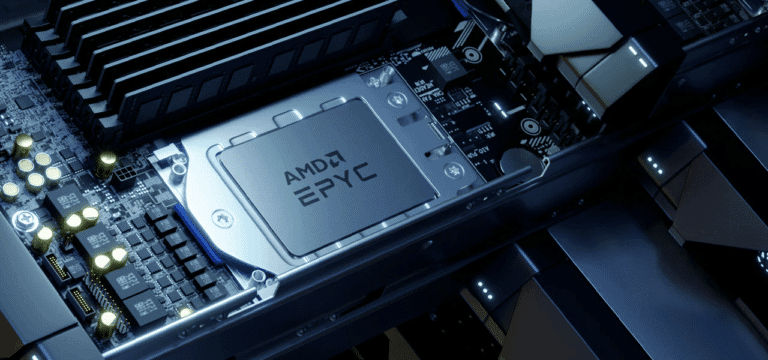AMD has unveiled its latest generation of server processors. The Epyc 7003 series processors are based on the new Zen 3 architecture. AMD claims that the top models are by far the fastest server processors on the market.
In total, AMD has unveiled 19 different processors. These range from a model with 8 cores to different versions with 64 cores, produced on TSMC’s 7nm process. In this sense, the new processors, codenamed Milan, are similar to their Rome predecessors. However, a key difference lies in the new Zen 3 architecture, which should bring an IPC improvement of up to 19 percent.
Innovations compared to Epyc Rome
Another improvement to the new processors is the way the cache is built. As with Epyc Rome, there is a maximum of 256MB of L3 cache available, but each core can now access up to 32MB of it, instead of the 16MB in the previous generation. AMD estimates that the best Epyc 7003 processors are roughly twice as fast per socket as the fastest server processors from Intel’s stable.
The new processors fit in the same SP3 socket as their predecessors, and many existing motherboards should be able to handle the new processors after a BIOS update. The processors support 128 PCIe 4.0 lanes and up to 4TB of DDR4-3200 memory per socket, supporting 8-channel memory.
AMD has also added some modern features to the new processors. For example, the company mentions support for SEV-NSP and new security features in AMD Infinity Guard.
Lineup
Among the new processors are four special models with an F in the type number. These processors are more focused on providing the highest possible speeds per core at the expense of total computing power. They have higher clock speeds and thus higher power consumption compared to the other processors with the same number of cores.
The new AMD Epyc Milan processors are available immediately. AMD is working with numerous server manufacturers to bring the processors to market. These include companies such as Dell, Lenovo, Supermicro, ASUS, Cisco, Foxconn, Gigabyte, HPE, MSI and Tyan. Major cloud providers such as Microsoft Azure, Google Cloud and AWS have also announced plans to implement the new Epyc processors in their data centres.
Tip: Dell presents PowerEdge XE8545 server with AMD EPYC and Nvidia A100
| Version | Cores/ threads | Frequency/ boost | TDP (W) | cTDP (W) | L3 cache | Price per 1k |
| 7763 | 64/128 | 2.45GHz/ 3.50GHz | 280 | 225-280 | 256MB | $ 7890 |
| 7713 | 64/128 | 2.00GHz/ 3.675GHz | 225 | 225-240 | 256MB | $ 7060 |
| 7713P | 64/128 | 2.00GHz/ 3.675GHz | 225 | 225-240 | 256MB | $ 5010 |
| 7663 | 56/112 | 2.00GHz/ 3.50GHz | 240 | 225-240 | 256MB | $ 6366 |
| 7643 | 48/96 | 2.30GHz/ 3.60GHz | 225 | 225-240 | 256MB | $ 4995 |
| 7543 | 32/64 | 2.80GHz/ 3.70GHz | 225 | 225-240 | 256MB | $ 3761 |
| 7543P | 32/64 | 2.80GHz/ 3.70GHz | 225 | 225-240 | 256MB | $ 2730 |
| 7513 | 32/64 | 2.60GHz/ 3.65GHz | 200 | 165-200 | 128MB | $ 2840 |
| 7453 | 28/56 | 2.75GHz/ 3.45GHz | 225 | 225-240 | 64MB | $ 1570 |
| 7443 | 24/48 | 2.85GHz/ 4.00GHz | 200 | 165-200 | 128MB | $ 2010 |
| 7443P | 24/48 | 2.85GHz/ 4.00GHz | 200 | 165-200 | 128MB | $ 1337 |
| 7413 | 24/48 | 2.65GHz/ 3.60GHz | 180 | 165-200 | 128MB | $ 1825 |
| 7343 | 16/32 | 3.20GHz/ 3.90GHz | 190 | 165-200 | 128MB | $ 1565 |
| 7313 | 16/32 | 3.00GHz/ 3.70GHz | 155 | 155-180 | 128MB | $ 1083 |
| 7313P | 16/32 | 3.00GHz/ 3.70GHz | 155 | 155-180 | 128MB | $ 913 |
| 75F3 | 32/64 | 2.95GHz/ 4.00GHz | 280W | 225-280W | 256MB | $ 4860 |
| 74F3 | 24/48 | 3.20GHz/ 4.00GHz | 240W | 225-240W | 256MB | $ 2900 |
| 73F3 | 16/32 | 3.50GHz/ 4.00GHz | 240W | 225-240W | 256MB | $ 3521 |
| 72F3 | 8/16 | 3.70GHz/ 4.10GHz | 180W | 165-200W | 256MB | $ 2468 |
